Traces of Enayat by Iman Mersal, translated from the Arabic by Robin Moger, And Other Stories, 2023
Since the ninth century, Cairo’s City of the Dead has served as the final resting place for Egypt’s caliphs, saints, poets and heroes. Their reprieve was disturbed a few months ago, however, when the Egyptian government began razing tombs in the necropolis to build a new highway. It’s a familiar trope: the uprooting of entire genealogies, the clearing away of accreting dust, all in the name of an ever-accelerated infrastructural modernity. Yet it isn’t only the dead who will be uprooted; many impoverished communities, working as morticians or caretakers, have built lives amid the deceased. Perhaps the cruellest irony is that the living, too, will be displaced in one fell swoop, sacrificed to what one writer has called “asphalt fever”.
She might not have known it then, but Iman Mersal’s perambulations through the City of the Dead in 2015, recorded in her sublimely digressive and moving Traces of Enayat, now read like premonitions of its disappearance. Primarily known for her poetry (her collection The Threshold was published in English translation by Robyn Creswell last year), Mersal is associated with Cairo’s nineties generation—a literary movement loosely characterised by a mistrust of totalising ideologies and an attentiveness to fractures in personal identity. One of her enduring themes have been to examine how exactly, if at all, the individual can be conjugated with the collective—the untraversable chasms that divide a self from another. It would not be too far a leap to connect Mersal’s quest to excavate hidden lives to Cairo’s penchant for hiding away—and obliterating—everything it deems trivial enough to forget.
Traces of Enayat resembles a biography, but is more so a catalogue of absence, a profound meditation on the limits and contingencies of the archive. Just as “there are no signs to mark boundaries in the City of the Dead”, Mersal’s hybrid work refuses the rigidity of genre. Winner of the Sheikh Zayed Book Award, it approximates the baggy shape of what she herself terms “jins jaami, a catch-all for every literary form and approach”. Julian Barnes’s famous comparison of biography to a “trawling net” is here overturned: rather than the thrashing fish hauled on shore, Mersal cares more about what has slipped away through the crevices—wanting, in fact, to document the constitution of the net itself as a “collection of holes tied together with string”. The result is a text in which theory, memoir, fiction, urban legend, and photography jostle against interleaved histories of psychiatric hospitals, marital law, golden-age cinema, orientalist Egyptology, and contested literary legacies.

